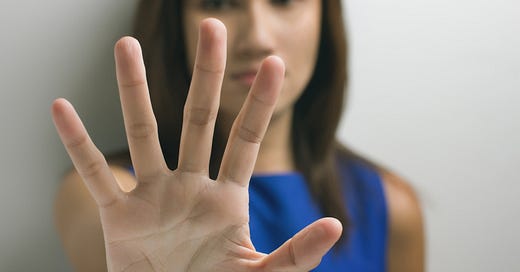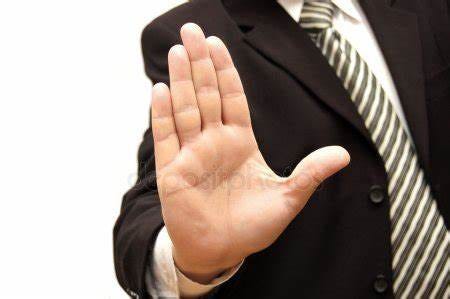The Body Language of Censorship
Robert F. Kennedy, Jr gets "Shut up hands" from Breaking Points Krystal Ball
Louis Conte’s The Truth be Told: Exploring corruption, controversy, and deception in today’s world from the perspective of a forensic psychophysiologist (Polygraph Examiner).
Louis Conte is a professional Polygraph Examiner, investigator, and writer. In addition to the thousands of offenders he interviewed over his thirty-three years in law enforcement, Conte has conducted over fourteen hundred polygraph cases. He uses well-honed observation skills to ferret out the truth. Observation and careful attention to words and behavior often reveal the truth.
Presidential candidate Robert F. Kennedy, Jr. claims that he has been censored for almost two decades for advocating for vaccine safety. He has described himself as having been unfairly labeled “a pariah” for expressing views skeptical of vaccines.
In thinking about a series of articles that Dr. James Lyons-Weiler has been posting on his Popular Rationalism Substack called the Open Society Series, I found myself thinking about the issue of censorship. I propose that the phenomena of censorship, defined as the suppression or removal of speech, writing, artistic work, etc. considered to be obscene, politically unacceptable, or a threat to security, is a form of deception writ large.
Censorship is a vehicle of deception because it suppresses information that people ought to be allowed to hear. Certainly, there are numerous historical instances where censorship has suppressed truth to the detriment of society.
Is there body language associated with censorship?
Yes. Following are two examples:
Take a few minutes to review this video of Mr. Kennedy being interviewed by Krystal Ball on the Breaking Points podcast:
In this interview, Krystal Ball gives the “Shut-up hands” to Mr. Kennedy at 1:14 for 13 seconds indicating that she really does not want Mr. Kennedy to respond to her criticism of his views on vaccines. She closes her eyes for excessive periods of time during this exchange and often diverts them to the camera. Ms. Ball seems anxious and wants to hurry through discussion of this issue even though she brought Kennedy’s vaccine controversies into the discussion. Ball repeatedly cuts Kennedy off, preventing him from fully responding.
Ball goes on to say that Kennedy will not be able to convince her – and other Democrats like her – that his vaccine criticisms have merit. Ball repeatedly prevents Kennedy from providing information that could explain his position.
This is not the way a professional interview is to be handled. The interviewee is supposed to be allowed to answer questions.
Mr. Kennedy does not over-react to Ms. Ball’s behavior and replies, “Please tell me where you think I got it wrong.”
Ball then asks the viewers to watch Megyn Kelly’s interview with Mr. Kennedy “where she goes through these issues with you piece by piece, by piece…” Ball implies that Megyn Kelly dissected Mr. Kennedy’s vaccine skepticism and demonstrated that his views are not supported.
I did what Ms. Ball suggested.
In the video below, Megyn Kelly addresses what she found when she and her staff investigated the veracity of statements made by Mr. Kennedy in that interview:
Ms. Kelly did dissect Mr. Kennedy’s assertions about vaccine issues. Kelly and her staff found that his statements were supported by data. Contrary to what Krystal Ball implied, Kelly found Kennedy credible.
Kelly stated, “Your claims checked out! The most controversial stuff that you get labeled a kook for saying, checked out time after time after time…my takeaway was that this guy has been unfairly maligned.” She added, “The censorship actually does have a negative effect on you.” Kelly stated that she learned valuable information from her interview with Kennedy.
And that is what Mr. Kennedy has been driving at. Toward the end of the interview, Kennedy asks citizens to do their own research, question him and everyone else in authority in the interests of protecting their children. He states that democracy requires an informed citizenry. In Kennedy’s view, citizens are allowed to ask questions and authority should not be blindly followed.
The “shut up hands” that Ms. Ball used in her interview with Mr. Kennedy demonstrates a desire to silence debate on a prominent issue. As indicated in their posted comments, Ball’s behavior was perceived by her own audience as disrespectful.
A professional must convey to the person they are interviewing that they will be respected and allowed to voice their opinions, even if there is a disagreement. Respect is the first principle of successful interviewing. It is the first principle of any conversation where people seek to learn from each other and work together.
Censorship is a tool of deception. “Shut up hands” are a hallmark of those to seek to impose silence. They denote an effort to suppress speech and expression. Censorship is a way to impose silence on a societal basis. It is disrespectful and harmful to individuals and to society.
The antidote to censorship is open discourse, debate, and the free flow of information. It is the only way that the truth can be told.
Please read the Open Society Series at Dr. James Lyons-Weiler’s Popular Rationalism.









Kristal has a closed mind. That is what the hands are telling me. She will not ever let the truth in that challenges her paradigm of thinking and where she turns to reinforce her beliefs.
Thank you Louis for posting this! There are lots of Kristals in this intentionally misinformed world.